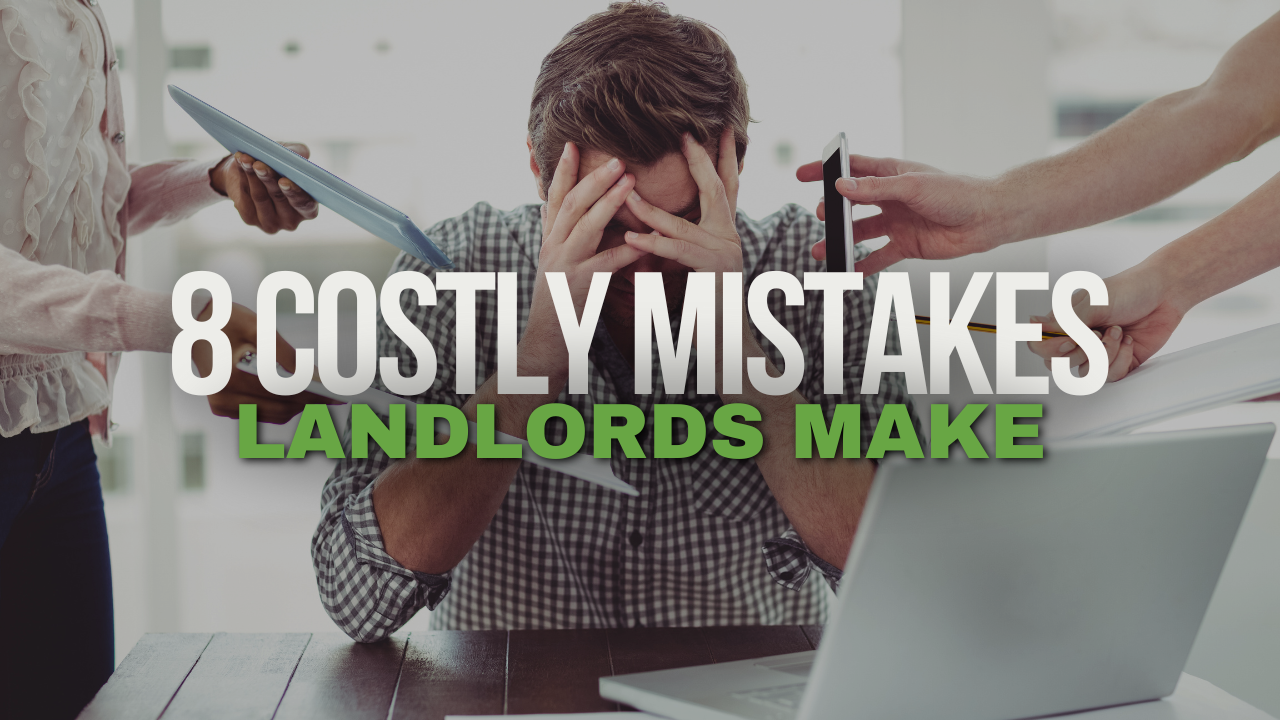8 Costly Mistakes Landlords Make
Being a landlord in Canada can be a rewarding investment, but even the most experienced landlords can fall into common pitfalls. These mistakes can lead to financial losses, tenant disputes, or even legal issues. Fortunately, many of these problems can be avoided with the right knowledge and strategies. Here are 8 costly mistakes landlords often make and how you can avoid them.

Inadequate Tenant Screening
One of the most significant mistakes landlords make is rushing the tenant screening process. Not thoroughly vetting tenants can lead to issues such as late payments, property damage, and even costly evictions. You want to ensure that you are renting your property to responsible individuals.
Solution: Implement a thorough screening process that includes background checks, credit history evaluations, employment verification, and references from previous landlords. If this feels overwhelming, consider outsourcing the tenant screening process to a professional property management company.
Resources:
- Tenant Verification Service: Provides background checks, credit reports, and reference checks for Canadian landlords.
- Ontario Landlords Association: Offers tips and resources for tenant screening.
Ignoring Maintenance Issues
Another common mistake is neglecting maintenance issues. Failing to maintain your property can turn small problems into costly repairs and may even lead to legal issues if the property is deemed uninhabitable.
Solution: Set up a proactive maintenance schedule that includes regular inspections and quick responses to tenant-reported problems. Routine maintenance can help prevent more significant, more expensive repairs in the future.
Resources:
- CMHC Maintenance and Repair Guide: Provides guidelines for regular maintenance and repairs to keep your property in good shape.
Underestimating the Cost of Vacancies
Vacancies are an inevitable part of being a landlord, but many landlords underestimate their financial impact. Vacant properties mean lost rental income, and the longer your property sits empty, the more you lose.
Solution: Keep an emergency fund for vacancies and consider hiring a property management company to help market your property and reduce downtime between tenants. They can help ensure a quicker turnaround and lower vacancy rates.
Resources:
- Landlord’s Guide to Reducing Vacancies: Offers insights on filling vacancies faster in Canada.
Poor Lease Agreements
A poorly drafted lease agreement can leave you vulnerable to tenant disputes and legal problems. Generic lease agreements often fail to address specific issues, and if your lease doesn’t comply with provincial laws, you could be in trouble.
Solution: Customize your lease agreements with the help of a real estate lawyer or an experienced property manager. Make sure your lease complies with local regulations and covers all important areas like rent payment terms, maintenance responsibilities, and eviction procedures.
Resources:
- Government of Canada Rental Housing Rights and Responsibilities: Outlines the essential rights and responsibilities for landlords and tenants.
- Ontario Residential Tenancies Act: Review this law to ensure your lease agreements are legally compliant in Ontario.
Inadequate Knowledge of Landlord-Tenant Laws
Violating landlord-tenant laws can lead to hefty fines or even lawsuits. Laws vary by province and cover everything from notice periods to rent control. Not knowing the laws in your area can be costly.
Solution: Stay informed about local, provincial, and federal regulations regarding rental properties. If you’re unsure, work with a property management company that understands these laws and can help you stay compliant.
Resources:
- Provincial and Territorial Laws on Renting: CMHC provides a breakdown of landlord-tenant laws across Canadian provinces.
- Landlord’s Self Help Centre: A legal resource center for landlords in Ontario.
Setting the Wrong Rent Price
Setting the wrong rent price can result in prolonged vacancies if the price is too high, or lost revenue if it’s too low. Pricing your rental property accurately is crucial to ensuring a steady income.
Solution: Conduct thorough market research to determine the competitive rent for similar properties in your area. Consider working with a property manager who can provide detailed rent analysis based on current market conditions.
Resources:
- Rentals.ca Rent Reports: Provides monthly rent reports for cities across Canada.
- PadMapper Canadian Rent Report: Offers a detailed look at rent trends in Canadian cities.
Poor Communication with Tenants
Poor communication can lead to misunderstandings, tenant dissatisfaction, and even legal disputes. Keeping an open line of communication is essential to maintaining a good relationship with your tenants.
Solution: Establish clear communication channels from the beginning. Be responsive to tenant requests and inquiries, and set expectations for how and when tenants can reach you.
Resources:
- Landlord-Tenant Communication Tips: Offers advice for fostering better landlord-tenant relationships.
Failing to Keep Proper Records
Failing to keep accurate records is a mistake that can have multiple consequences. Disorganized financial records, lease agreements, and maintenance logs can lead to tax issues, disputes with tenants, and difficulty tracking your property’s performance.
Solution: Use property management software to organize and track your records. Alternatively, hire a property management company to ensure everything is documented and easily accessible when needed.
Resources:
- Buildium Property Management Software: Software to help you manage rental property records.
- QuickBooks for Landlords: An accounting tool that simplifies financial record-keeping for landlords.
Conclusion
Avoiding these common mistakes can help you protect your investment and ensure a successful rental property experience. By proactively screening tenants, staying on top of maintenance, understanding the laws, and maintaining good communication with your tenants, you can avoid these pitfalls and maximize your rental income.
